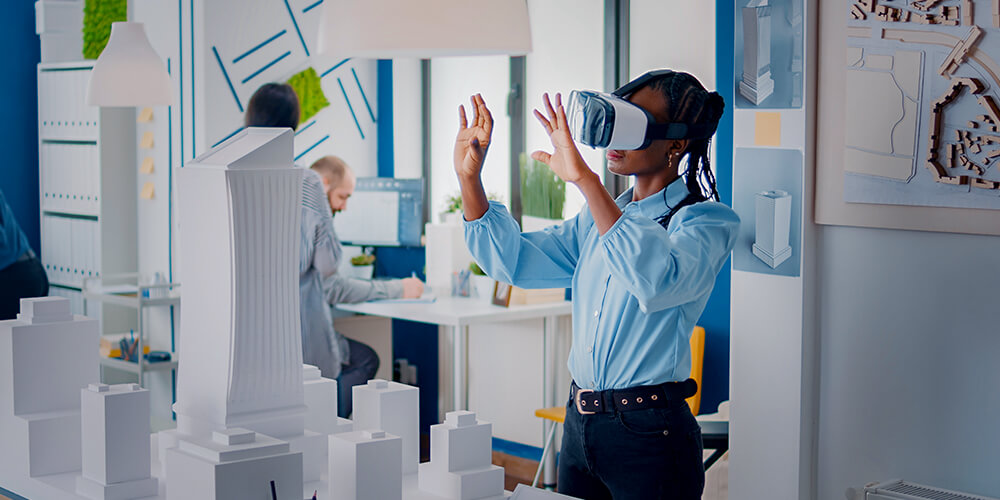To be precise, there has been a lot of hype created about Metaverse, since Facebook renamed itself “Meta”. And ever since there has been a constant state of confusion going on about Metaverse as a platform, and its objective. Considering digitalization, every quarter there is a new industry associated with the metaverse.
A few theories are floating around regarding the metaverse, its origin, purpose, and applications. Not a very clear picture, but yes, a vague idea of Metaverse is an online platform, precisely a virtual reality. But then again with this idea comes a bunch of questions associated with it, and every explanation paints a different picture of the meta world, and so far, no one has been able to define it to its full potential, along with its future.
Defining the idea of Metaverse
One thing that is clear from the discussions going on and the vague ideas is that Metaverse serves as a virtual platform combining both virtual and other mixed reality. This unique platform provides users with a virtual experience of being in a specific place, socializing, entertainment, and other purposes. It is a 3D virtual world, providing the users with a real-life-like experience.
Metaverse is an online 3D space where users can interact with one another as well as with computer-generated items and avatars. It is an online world with the Internet acting as its main network. The use of metaverses is widespread and includes social networking, online gaming, instruction, and training. They can be used to construct wholly other, fictional worlds or virtual ones that closely resemble the real world.
They provide a singular and immersive online experience unmatched by anything else. They provide countless opportunities for exploration and connection while continuously growing and improving.
Possibilities of Metaverse
With the technological developments going on, Metaverse has found its application in several industries and is being implemented currently in a few more. No doubt, the metaverse industries, are experiencing a drift to a different form of technology but with this technological drift the possibilities of what the industries can offer, their performance, and their future have increased at a certain level.
Although according to some researchers the metaverse we are experiencing is not the actual metaverse, rather we are on a journey to the actual metaverse which is going to take a bit more technological advancements and adaptations. Metaverse is often associated with the Blockchain world to enable the purchasing or selling of virtual space, virtual items, clothes, and other things.
So far metaverse has applications in socializing, gaming, and virtual assets purchase/sell. But as a recent trend, metaverse has also been applied to healthcare, education, manufacturing, and military services for several reasons. With metaverse application, the functioning of the industries has been enhanced and has also worked to provide a different perspective for the user experience, and even for the organizations, it has come out as a new opportunity to scale up.
What does Metaverse mean in Real estate?
As a recent trend, all industries are following the ongoing technological trends to keep them updated and relevant in the industry, the real estate industry has also done the same. With the introduction of the metaverse, the real estate industry has also leveraged technology to make its business operations efficient. The adoption of this new technology has provided real estate with an extra edge where the industry has upscaled its operations and is providing benefits to both, clients, and realtors.
Metaverse has introduced certain features for the industry such as:
- Visualization
While buying a property a client needs to visualize the place as they would like to make it. To date, the visualization process has been done via sketches only which at times don’t provide the exact idea of how the place would look. But with the implementation of metaverse the clients can make a 3D rendition of the property and make the changes they would like in the property, this provides them with a better experience, taking the real estate to a next level in terms of customer experience.
- Construction
Site visits, on-site work, and coordination are necessary for construction. The construction must be precisely planned and executed, and the site must be carefully measured and assessed. Human error can result in inefficiencies and errors in measuring quantities and assessing progress.
We may potentially create a program that accurately maps the sites in the metaverse, enabling engineers and construction workers to view a very exact representation of the real site from the comfort of their homes or workplaces. They would be able to spend less time traveling to these multiple site sites, which would allow them to conduct site surveys, make more accurate status reports, and more accurately predict project delays.
- Site view/ Property Visit
When the time comes to sell the house again, VR applications in the metaverse can greatly simplify the home-visiting procedure for both the real estate agent and potential purchasers. Instead of depending on pictures and shoddy videos, prospective buyers who live abroad and across the country would be able to see a virtual representation of the house in the metaverse and enjoy a similar experience to customers who visit in person. Real estate virtual reality shows are already happening. There are VR solutions that allow prospective homeowners to take virtual reality tours using VR headsets and compatible smartphones. Large developers will soon use this technology in their sales offices as well.
- Increased Sale
It is often observed that once client takes a tour of the property before purchasing it, the chances of them buying it increases, as they can picture the place as per their needs. But with metaverse in the picture, clients can design the entire place as per their choice, take a virtual tour and modify things without investing, which makes it easy, convenient, and affordable. With this comes a higher probability of clients purchasing as the place has been modified as per their needs and they see the place as their new home.
Future of the real estate industry
In the coming years, the real estate industry while implementing innovative technologies is excelling the growth and expansion. In the coming years, the industry is predicted to be among the top-growing industries, with the incorporation of the metaverse this growth is again to be on an exponential scale. Additionally, in the current scenario where everything is moving online, from banks to education, and the medical consulting industry as well, the real estate industry is also moving on the online-only platform with the introduction of metaverse capabilities.
Moving forward with the trend
Even with the discussed aspects of the metaverse, there is an ongoing debate about whether the metaverse trend will be effective for the real estate industry or if is it just another hype and will dissolve in a matter of time.
As the metaverse is settling itself in the industry and making its place, other industries are as well adapting to it there is some amount of uncertainty about the future of the metaverse, still, there is one statement to be concluded from the discussed facts in the coming years ‘the adaptation to metaverse for its virtual reality experience is going to be a major part of most industries.’ The real estate industry is benefiting from the metaverse at this moment, and it can be concluded from the above-discussed points that the metaverse carries enormous potential for the real estate industry to explore. At the same point with such virtual, and online modes of technology security concern is always present.
Although with the metaverse the real estate industry is experiencing growth and discovering new aspects of customer experience if at one point the metaverse goes offline or becomes inaccessible, as compared to other industries there is not much on stake for the real estate market. The entire process would fall back to the traditional process, and the industry would still be running smoothly.
The final word for the industry
There is a lot for the real estate industry to explore with the metaverse but there is not much to lose if this doesn’t work out at a point. Making any conclusions based on the data might not be fair for either of the industry but at the same point, it is evident that the metaverse is becoming a rising trend in the real estate world.
With the virtual reality collaboration, the real estate industry is offering a new aspect to the industry with better customer experience, increased sales, better working scenarios, and more options for the customers to choose from. The industry is expanding and the metaverse is a contributing factor to this growth.
Furthermore, the metaverse has not displayed any fallbacks to date, and the real estate industry also hasn’t experienced any fallouts with the metaverse, it can be stated for a fact that the metaverse is a trend that would survive and expand with the real estate industry.





